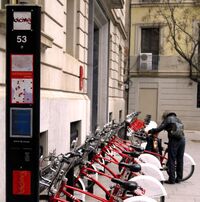
Approaches to support Tactical Service Network Design of Bike Sharing Systems

Bike Sharing Systems (BSS) are a promising approach to tackle critical problems of today’s urban mobility. However, the acceptance of BSS depends on the service level of the system, i.e., the successful provision of bikes for rentals and free bike racks for returns. Due to spatio-temporal demand variation, one-way trips and limited capacity of stations, rentals or returns may not be possible for every customer. Therefore, suitable bike fill levels for every station have to be determined, in order to ensure service reliability.
Within the scope of the tactical planning level, target fill levels have to be determined for each station through the course of the day. Within the scope of the operational planning level, the BSS provider relocates bikes among stations based on the target fill levels. Fill levels and relocation operations are interdependent since relocations are required to compensate for inadequate fill levels. Neglecting relocation operations in the tactical planning level may lead to suboptimal target fill level decisions. Therefore, anticipation of operational decisions in the tactical planning level is crucial for the viability of BSS.
Tactical Service Network Design (SND) yields regular services to transship goods between suppliers and demanders in order to achieve a suitable trade-off between the customer service level and the systems operation costs. The notion of SND is adapted for the BSS context (SND-BSS) to determine target fill levels and a suitable anticipation of operational decisions. The SND-BSS is formulated as a network flow programming, in which bikes are moved among the stations due to either bike demand or relocations.
The SND-BSS approach provides time-dependent target fill levels for every station. It is ensured that the relocation operations by means of ST are cost-efficient and a strong anticipation of operational decisions.
Researcher: Ing. Bruno Neumann
Student Research Projects
2015
Eine heuristische Lösungsannäherung basierend auf der Clusterbildung für taktische Servicenetzwerke von Bike-Sharing Systemen (Jens Hakkers)
Analyse und Optimierung des Kapazitätsbedarfs im Planungsprozess eines international agierenden Unternehmens: am Beispiel des Taufungsprozess der Volkswagen AG (Torben Baube)